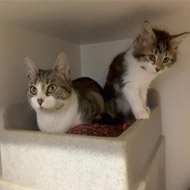
Cat charity urges owners to get their cats neutered
Un-neutered mother cats and their kittens are the largest groups of cats being rescued, according to figures published by Yorkshire Cat Rescue.
The charity says the data has prompted them to ‘sound the alarm’ and urge people to get their cats neutered before they reach full maturity.
“We have been taking in a lot of pregnant cats, but even I was surprised at how large a proportion of our rescues fall into this category,” said Sam Davies, centre manager of Yorkshire Cat Rescue.
"Most of them are friendly and have clearly not always been living outside; they have either been abandoned or gotten lost which in itself is sad. But the bigger problem is that they have very rarely been neutered."
The figures show that between September 2015 and September 2016, Yorkshire Cat Rescue took in 963 cats and kittens. Around half of these cats (449) were un-neutered spays. Of that half, 365 were kittens that have been born outside.
“If we had not stepped in, those 265 kittens would either have died or grown up to breed themselves; exacerbating the country’s problem with feral cats. Neither is a very comforting prospect,” added Ms Davies.
According to International Cat Care, 80 per cent of kittens born outdoors do not live past their first year. The females that do survive become part of the feral breeding population before they reach the age of one year.
Sam explains that in the 12 months between September 2015 and 2016, Yorkshire Cat Rescue took in, among others, 32 pregnant stray cats that gave birth to 87 kittens in their care and 71 un-neutered, stray females.
One of these cats was Rita - a pregnant cat who was already nursing two kittens. She now has two 11-week old kittens and four week-old kittens.
"Rita is a prime example of what is happening to homeless, female cats across the country," Sam continued. “It is sad that she is in this position, but sadly her story is far from extraordinary or unique. The message really has to start getting through to pet owners: neuter your cats."
Image (C) Yorkshire Cat Rescue



 The RCVS has announced a new version of its 1CPD mobile app, with enhanced features for veterinary surgeons and veterinary nurses to record their continuing professional development.
The RCVS has announced a new version of its 1CPD mobile app, with enhanced features for veterinary surgeons and veterinary nurses to record their continuing professional development.